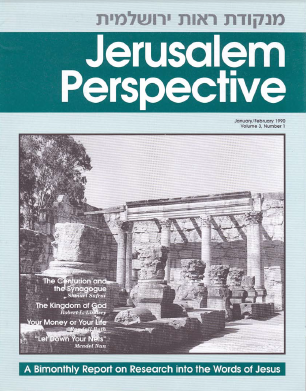Question received from a reader in Los Angeles, California, U.S.A that was published in the “Readers’ Perspective” column of Jerusalem Perspective 24 (Jan.-Feb. 1990): 2.
Lately I have read about the work of the Jesus Seminar…. Apparently these scholars are voting to decide which of the sayings of Jesus are really his own. What is your reaction to what they are doing?
David Bivin responds:
Scholars of the Jesus Seminar are strongly influenced by the theory of dissimilarity. As propounded by Norman Perrin (The Kingdom of God in the Teaching of Jesus [The Westminster Press, 1963]; Rediscovering the Teaching of Jesus [Harper & Row, 1967]) and others, this theory states that, in general, only those portions of the Gospels that have no parallels in ancient literature are authentic. The assumption is that anything that has a parallel must have been copied and wrongly attributed to Jesus.
Because the Jesus Seminar scholars have presumed that the only true words of Jesus are those devoid of any Hebraic reference, they have failed to consider important rabbinic parallels, and have also found themselves obliged to excise a great deal of Jesus’ teaching. They have held votes on Jesus’ sayings, and almost every saying that reflects a verse from Hebrew Scripture has been rejected. Thus, “Blessed are the meek for they will inherit the earth” (Matt. 5:5) has been excluded because it echoes Psalm 37:11, and “Blessed are the pure in heart for they will see God” (Matt. 5:8) has been eliminated because the Jesus Seminar scholars believe it is based on Psalm 24:3-4. Most of the Lord’s Prayer has been rejected because of its rabbinic phraseology.
Evidence from the Gospels and other literature of the period clearly shows that Jesus was very much rooted in first-century Judaism and, like all such sages, drew heavily on Scripture. Jesus was a typical Jewish sage in every way but one: he claimed to be the Messiah. Yet even this special claim was made in very rabbinic ways, with subtle allusions to biblical prophecies that might easily be missed by those not versed in rabbinic teachings.
Many New Testament scholars fail to recognize the importance of the Hebraic background to Jesus’ words. But it seems especially unfortunate that the Jesus Seminar purposely rejects the validity of any Gospel saying that contains scriptural or rabbinic parallels.




